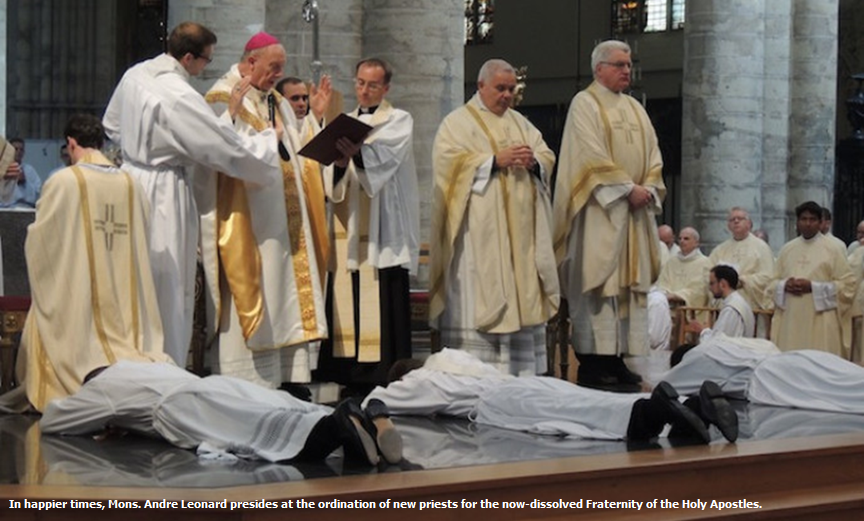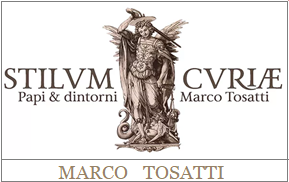 So far, I have read this story - on the ultimate fate and extinction of a new religious order born in Brussels just a few years ago - from Marco Tosatti who writes
So far, I have read this story - on the ultimate fate and extinction of a new religious order born in Brussels just a few years ago - from Marco Tosatti who writes
about it in both La Nuova Bussola Quotidiana (LNBQ) and his own blog. It is probably just one of many such unreported incidents of Jorge Bergoglio's arbitrary
abuse of papal power and authority. Self-righteous tyrants, especially those who outrageously lay claim to holiness, do not, in general, advertise their tyrannies.
Bergoglio puts an end
to the fraternity of miracles
The pope signed a decree dissolving the Fraternity of the Holy Apostles in Brussels
which had a number of priests and seminarians in the ecclesial desert of that city
by Marco Tosatti
Translated from

April 12, 2018
Do you remember the case of the Priestly Fraternity of the Holy Apostles of Brussels? In the disastrous panorama of the Church in Belgium and of what is perhaps the most de-Christianized capital in Europe, the then Archbishop of Maline-Brussels, Andre Leonard, had created this fraternity in 2013, inspired by the charism of the French priest Michel-Marie Zanotti-Sorkine.
It had 23 seminarians and 6 priests to begin with. An extraordinary event in a church where the year before, there was not a single new seminarian in the country’s Francophone region.
Mons. Leonard entrusted the Fraternity with a parish in the center of Brussels, Saint Catherine, where their presence soon marked a new flourishing of faith and faith-based activity.
Then Mons. Leonard – a man of faith who had undergone attacks (even physical ones) and humiliations for his defense of the values of the Church – not only failed to get a cardinal’s hat as expected logically, but as soon as he turned 75, his resignation was promptly accepted by Pope Francis.
Who replaced him with Mons. De Kesel, protégé of the controversial Cardinal Danneels (Archbishop of Brussels for … years until his retirement) who had been under investigation for having protected a bishop guilty of sexually abusing his own nephew.
And of course, De Kesel was promptly made a cardinal. One of his first actions was to decide to stop ‘hosting’ the Fraternity, to which in the meantime, another parish had been assigned. His reason for doing so was that many of the Fraternity’s seminarians were French, and for reasons of episcopal solidarity, it would be better that they returned to their own dioceses in France.
The faithful of Brussels did not accept that excuse at all and requested a meeting with the cardinal to express their support of the Fraternity.
“Mons. De Kesel no longer wants to host the Fraternity because it has too many French seminarians. Is he not the bishop of the capital of Europe in the 21st century? The principle of episcopal solidarity which he invokes for discontinuing the initiative of Mons. Leonard – despite all the successes of the Fraternity which he himself, De Kesel, acknowledged in the document announcing his decision – makes no sense at all. Of the 80 seminarians now in Namur (site of the Belgian national seminary), only 25 are Belgian. Will he now send home all the African and Polish priests who have come to help us spread the word of Jesus in Belgium? Is the Catholic Church no longer universal and does it no longer transcend borders?”
Nonetheless the order was disenfranchised. Yet we write of this sad episode again because in recent days, we received important information on a decisive event in the brief history of the Fraternity – an event that took place in Rome and unfortunately, under the signature of the reigning pope.
In short: While the case of the Fraternity was being discussed in Brussels in an effort to find a solution, two lay couples decided to follow a legal recourse that is normal in such cases, and addressed themselves to the church tribunals in Rome. They presented an appeal against the decision of De Kesel to the Congregation for the Clergy, which under Bergoglio is no longer headed by Cardinal Mauro Piacenza, replaced by Bergoglio during his first month as pope back in 2013, with Mons. Beniamino Stella, onetime Vatican diplomat who headed the Pontifical Ecclesiastical Academy that trains Vatican diplomats, and who promptly became one of the first cardinals named by Bergoglio.
[And according to those in the know, the real 'grey eminence' at Casa Santa Marta.]
In November 2016, so we were told by the couples who made the appeal, the Congregation for the Clergy denied “without giving any reason” their very
jus standi, namely, their right to appear before a Church court to present their appeal. At the same time, the Congregation confirmed De Kesel’s decree to dissolve the Fraternity.
In such cases, the last recourse is represented by the Apostolic Signatura, the Supreme Tribunal of the Church, before which any Catholic, lay or clerical, can appeal to defend their ecclesiastical rights. But of course, the Tribunal was no longer headed by Cardinal Burke who had been replaced by Bergoglio with the former ‘Foreign Minister’ of the Vatican, Archbishop Dominique Mamberti, another diplomat.
In December 2016, the lay appellants presented their case to the Apostolic Signatura, whose Promoter of Justice saw merit in their cause, which was to have been presented to the Tribunal’s judges for a decision in the autumn of 2017. “And so, we were confident that justice and truth would finally prevail”, the appellants wrote us.
At this point, the case took a turn for the worst. On November 25, the appellants were informed by a letter from the Signatura that their appeal had run its course and the case was closed. Because, without waiting for the Signatura to decide on the case ‘
dum summarium conficiebatur [although a summary had been prepared], the Prefect of the Congregation for the Clergy had brought the decree dissolving the Fraternity to the Pope himself for his signature, who thus took on the responsibility for it.
And Bergoglio signed it – an imperial act which certainly seems like a blow to the ecclesial rights of those concerned [the Fraternity and the lay faithful who were appealing to Rome in their behalf].
This is a story which certainly does not reflect well on the actions of some people at the top in the ‘reformed’ Roman Curia and on the pope himself. It is an ugly story.
Bergoglio and law within the Church:
From monarchy to tyranny, in the case of
a Belgian order he has summarily dissolved
Translated from

April 12, 2018
Today in LNBQ I write about how a Belgian religious community, the Fraternity of the Holy Apostles, has been destroyed, and above all, about how it was denied the right to have recourse to ordinary justice in the Church.
In recent days I received documents that explain how this happened – because the reigning pope signed an act which prevented the normal course of justice to operate within the Church.
I got the documents precisely on the day the pope issued his latest formal document, in which he writes about justice thus:
“Blessed are those who thirst and hunger for justice because they will be satisfied” Hunger and thirst are very intense experiences because they are responses to our primary needs and linked to the very instinct of survival. There are persons who aspire to justice with such an intensity and seek it with great desire. Jesus says that they will be satisfied, since sooner or later, justice will arrive, and we can work to that it becomes possible even if we will not always see the results of such efforts”.
But that has not been the case for the Fraternity of the Holy Apostles – just as it was not for the Franciscan Friars of the Immaculate.
I was about to write a commentary on this subject for the blog but in opening my mail, I found a new message from Super-Ex, which I am passing on to you. I advise everyone to read it, especially my own colleagues in the media.
Dear Marco, In your article for LNBQ, you explain the violent destruction by Bergoglio of the Priestly Fraternity of the Holy Apostles in Brussels - beyond and against every juridical procedure codified by the Church.
In doing so, you remind us why Bergoglio, not long after becoming pope, sought to ‘behead’ Cardinal Raymond Burke, whom Benedict XVI had chosen to head the Apostolic Signatura, the church’s supreme Tribunal, to which, as you wrote, “any person in the Church, clerical or lay, can have recourse if he thinks he must defend his rights [within the Church]”.
Why was Burke a problem that had to be resolved immediately? Because his Catholic mind recognizes that even in the Church, the quintessential hierarchical structure, there exists a justice that must be respected so that hierarchy does not become arbitrariness and arrogance.
When Burke points out [as he recently did at the April 7 conference in Rome] the limits of papal authority in matters of doctrine, doing so in full fidelity to Catholic doctrine as it has always been, he was simply speaking out as he would have if he were still the head of the Apostolic Signatura.
What does an ecclesial judge do? Certainly, he seeks to control that authority does not become despotism or tyranny, that it does not become a pretext to prevaricate against a priest, a layman, any baptized person. As a judge, Burke could see to it that Church authority respects its limitations in matters of governance.
But Bergoglio does not want any limitations – he does not think of himself as the Vicar of Christ, but as the absolute master of the Church – be it on doctrine (he couldn’t care less about cardinals, the popes before him, or the Gospel itself), or on canon law.
“If the Church did not have canon law,” Cardinal Caffarra once said, “then she becomes a tyranny and not a monarchy”. Even before The Dictator Pope was written, it had all become evident.
So Bergoglio wanted to change Church teaching about matrimony? He forces the hand of the two family synods he convened [he actually failed to do that but imposed his will anyway on the final declarations], he drafts Amoris Laetitia with the help of a small circle of his most faithful associates, enlists an army of journalists to besmirch his opponents, and refuses to respond to legitimate questions placed to him about that [nefarious] document.
Did he wish to do away with the FFI? His first move was to prevent them from having recourse to Church justice, and so for years, this community and its auxiliary orders have been ‘massacred’ – and all without having been formally charged of anything definite.
Did he want to take over the Soveriegn Order of Malta? He acts imperiously, in haste and fury, relying on the brute force of his ‘supreme’ authority and ignoring all applicable law. [Most notably, the sovereignty of the Order of Malta which has the same stature as the Vatican as a sovereign state in international law. Despite some pro forma mutterings in his captive media at the time this colossal mockery of international law took place, the episode appeared to be just another 'meaningless' wrinkle in history quickly ignored by the chroniclers, whiole the Bergoglio-enabled new masters of the Order seem blissfully uncaring that the Oder's sovereignty has been trampled and trashed so publicly.]
Does he need to prtoect his friend Cardinal Maradiaga? He blocks recourse to any proceedings against him, arrogates all the responsibility to himself, and nothing more is heard about it.
Brussels, in the person of Cardinal De Kesel, wanted the Fraternity of the Holy Apostles eradicated? The Vatican at your service, Your Eminence - obstructing the natural course of canon law and preventing any appeal from even being considered. [If the pope signs a decree dissolving the Fraternity, then any appeal in behalf of the Fraternity becomes moot because the entity in whose behalf the appeal is being made no longer exists.]
Of course, we must acknowledge, sadly, that Bergoglio has not been the first wild boar to rampage through the vineyard of the Lord. We have had arrogant and sinful popes in the past who, like Bergoglio, reveled in their royal court [meaning the sovereign’s retinue, not a judicial court], loved Power, and scoffed at the Law, mistaking their role as Vicar of Christ on earth for that of being God himself.
But for the most part, these were men who abused their power and authority in matters of governance and managing the affairs of the Church (her goods as well as her ministers).
With Bergoglio, however, both governance and doctrine are in the hands of a man who does not recognize any limits to his authority. Who keeps saying words like ‘mercy’ and ‘listening’ which he constantly contradicts in his actions.
But why are there so few cardinals who have openly come out against this abuse of power? Perhaps because most of them fear more the ire of ‘God’s vicar’ than God’s own justice?
I can only end with recalling that at the April 7 conference in Rome [called ‘Church, where are you going?’, but whose theme was really the limits of papal authority], hundreds of faithful came to demonstrate physically, in Rome, their disquiet with the state of the Church today.
They and all like them will surely undergo new anathemas and insults from Bergoglio but it is clear that they will no longer keep quiet.

